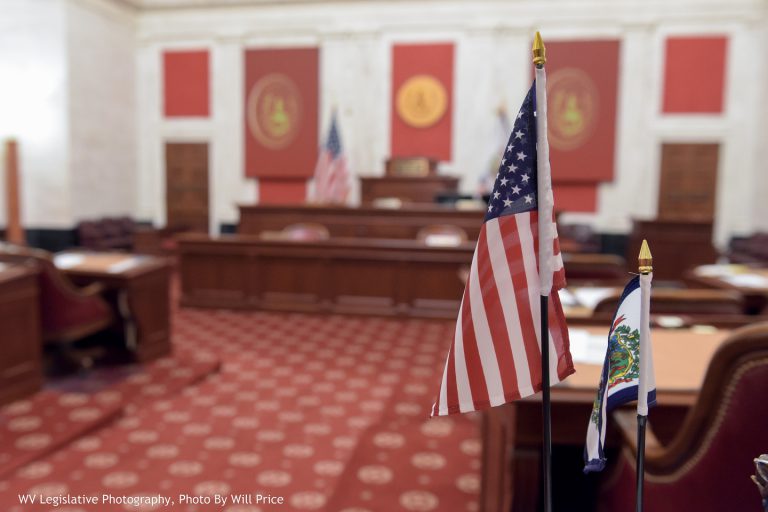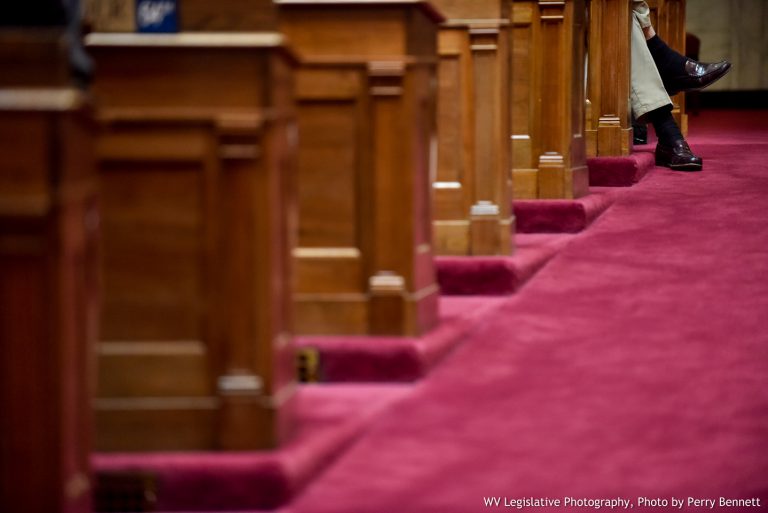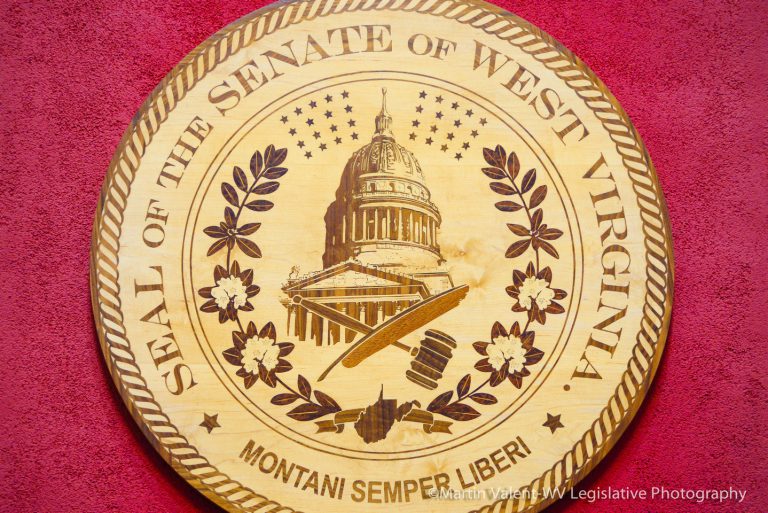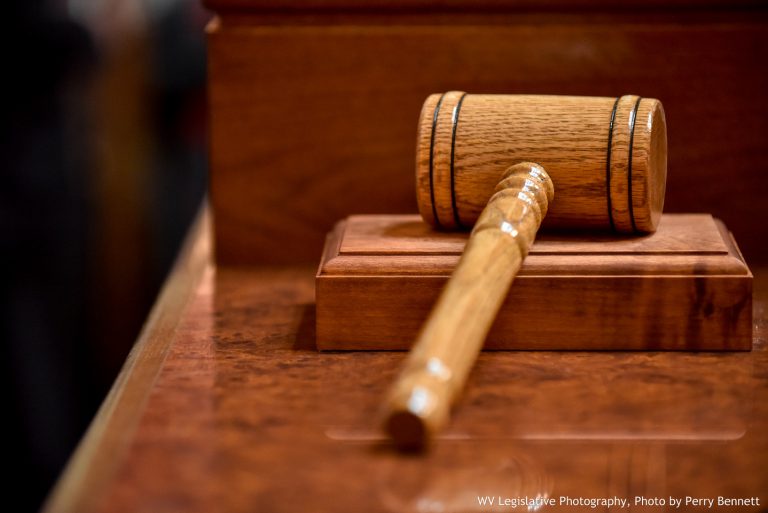Completed Legislation
As of 4 p.m., Wednesday, April 6, the 57th day of the 2005 Regular Session, 751 of bills have been introduced in the Senate. Of those, 205 have been passed. The House of Delegates introduced 1,362 of bills, with 229 passing that body. To date, 62 bills have completed legislative action.
Senate Bill 42 will provide a limitation of liability for clean-up costs for owners of property where waste tire accumulation has occurred because of others’ activities. The Division of Highways will be authorized to recover funds from prior owners of the property in certain circumstances and also require notice of illegal waste tire piles to be filed with the county clerk by the Division of Highways.
Senate Bill 104 will repeal a section of the West Virginia Code relating to prisoners working for county court systems, as the county courts are now called county commissions.
Senate Bill 122 will allow state-chartered banks to organize as limited liability companies. A person can apply to the Commissioner of Banking to obtain a Certificate of Authority to organize and operate as a bank if that limited liability company is formed to have perpetual existence, a centralized management, limited liability, free transferability of interests and if the Federal Deposit Insurance Corporation (FDIC) has ruled that the bank will be eligible for federal deposit insurance. An existing bank structured as a corporation also can apply to the Commissioner to reorganize and operate as a limited liability company.
Senate Bill 153 modifies the confidentiality provisions for proceedings before the Ethics Commission. The bill also will prohibit false information and determines the penalties for breaching the confidentiality provisions, and for submitting false information.
Senate Bill 183 allows a warden to give authorization to an inmate to withdraw money from his or her mandatory savings account in order to prepare the inmate for reentry into society.
Senate Bill 226 requires cross-reporting among child protective service workers, adult protective service workers, law-enforcement officers and humane officers when abuse or neglect of children, incapacitated or elderly adults, or cruelty or inhumane treatment to animals is suspected. The agencies will be required to report to each other within 24 hours of an abuse or cruelty investigation that results in reasonable suspicion.
Senate Bill 238 adds steel to current statutory provisions involving the purchase of scrap metals by various commercial entities. The bill also modifies the criminal parts of the law for offenders who violate the law.
Senate Bill 268 changes state law to conform to federal requirements under the Juvenile Justice and Delinquency Prevention Act, which states that any person over age 18 but under age 21 found in the possession of beer or liquor is guilty of a status offense instead of a misdemeanor. Those found guilty will be referred to the Department of Health and Human Resources for treatment, rather than the $1,000 fine or six-month incarceration penalties assessed to a misdemeanor.
Senate Bill 287 will transfer the authority to set forth rules relating to water quality standards from the Environmental Quality Board to the Department of Environmental Protection. This bill also establishes requirements for water protection such as standards of purity and quality for groundwater.
Senate Bill 401 establishes the adoption or transfer of orders, resolutions, policies, rules and obligations of the governing boards of New River Community and Technical College and the Community and Technical College of Shepherd. The bill also arranges for the division of assets and liabilities between the institutions and their administratively-linked community and technical colleges, while also providing guidelines for financial audits.
Senate Bill 417 will provide for the organization and joint ownership of joint development entities by municipalities and certain authorities.
Senate Bill 491 eliminates provisions of current state law that allow West Virginia to enter into an agreement with other states regarding out-of-state parolee supervision.
Senate Bill 614 updates the meaning of certain terms used in the Corporation Net Income Tax Act. This bill also provides the Tax Commissioner with additional remedies for noncompliance and for errors in computing federal taxable income.
Senate Bill 623 will update the meaning of “federal adjusted gross income” and other terms used but currently not defined in the West Virginia Personal Income Tax Act by bringing the terms into conformity with the federal income tax meanings and purposes. The American Jobs Creation Act, signed into law in 2004, includes a federal tax benefit for certain domestic production activities. This new section of State Code will disallow the deduction when determining West Virginia personal income tax liability.
Senate Bill 657 clarifies that the current 60-day time limit for filing an appeal with the Office of Tax Appeals would not apply when other sections of the West Virginia Code assert different time limits. For example, a portion of the Code says that when a jeopardy assessment is made against a taxpayer, that person is required to file a petition for reassessment within 20 days after receiving notice of the jeopardy assessment.
Senate Bill 692 requires a city manager only to be a resident of the city at the time of his/her appointment. The bill also removes an unconstitutional provision currently in the West Virginia Code which states that the mayor, a recorder and councilmen were required to have been assessed and also paid real or personal property taxes to a municipality for the year preceding their election.
House Bill 2128 allows the Executive Director of the West Virginia Regional Jail and Correctional Facility Authority to establish an inmate furlough program so that inmates may attend funerals or make hospital visits to terminally ill family members. The Director will have the ability to determine which inmates are not likely to jeopardize public safety and could be granted a furlough or special escort through the program.
House Bill 2174 will require the Department of Health and Human Resources to develop a procedure to notify licensed professionals to report suspected child abuse and neglect by Jan. 1, 2006.
House Bill 2350 makes a technical correction to a portion of State Code that addresses the awarding of teaching certificates in West Virginia. The bill adds to existing requirements for receiving a teaching certificate that candidates must possess the minimum of a bachelor’s degree or hold a certificate of eligibility issued by another state that certifies he or she meets all the requirements of the state for full certification.
House Bill 2381 requires public or private hospitals, nursing homes, assisted living residences, unlicensed health care homes and residential care communities to allow patients to see nonrelative visitors, unless otherwise requested by the patient or legal designee. The patient or legal designee will have the option of refusing to see nonrelative visitors and the health care facility also retains the right to restrict any visitors who are causing harm or disrupting the facility.
House Bill 2477 will make changes to a bill passed last year that increased the amount of property persons subject to a forced sale or execution can protect as personal property. The 2004 bill failed to reference provisions in the Consumer Protection Act, and the proposed bill brings those two provisions into conformity.
House Bill 2497 allows a truck with four axles to tow a trailer with two axles, but the maximum weight cannot exceed 88,000 pounds, including a 10 percent tolerance.
House Bill 2527 will allow employees of multi-county vocational schools to administer performance tests for service personnel in the counties served by the school. Current law only permits employees of the county board of education to administer the tests.
House Bill 2813 removes the requirement that a public utility must first obtain a certificate of public convenience and necessity from the Public Service Commission (PSC) before it can apply for all other necessary franchises, licenses and permits.
House Bill 2960 will allow licensed restaurants to sell sealed bottles of wine for consumption off the premises if the wine is produced by a West Virginia Farm Winery.
House Bill 2973 allows stockbrokers or dealers, in addition to banks, to act as custodians of insurance company securities. Current law allows only banks to act as custodians. Giving stockbrokers such a position eliminates the need for physically transferring paper certificates that prove ownership of a security.
House Bill 2981 declares certain claims against the state and its agencies to be moral obligations of the state. The bill requires the State Auditor to issue warrants for the payment of several claims.
House Bill 3012 exempts property being acquired by the state, a county, district, city, village, town or other political subdivision, state college or university from property tax.
House Bill 3033 extends the temporary special reclamation tax on coal for an additional 18 months. The bill also requires the Secretary of the Department of Environmental Protection (DEP) to pursue cost effective alternative water treatment strategies and to conduct studies every two years on the Special Reclamation Fund. The bill also will allow the Secretary to implement a full cost bonding program, a water quality trust fund program or other funding mechanisms in lieu of the per ton coal tax or a portion of it.
House Bill 3105 creates a special revenue fund known as the “Occupational Safety and Health Fund” in the state treasury for the administration of an occupational safety and health program that is under contract with the federal Department of Labor.
House Bill 3106 allows the Public Employees’ Insurance Agency to participate in the investment pools of the Investment Management Board and retain earnings on those investments.
House Bill 3219 amends provisions of the West Virginia Crimes Victim Compensation Act to designate that individuals authorized to act on behalf of a victim, dependent or third person include those who hold power of attorney or others who hold authority to submit claims.
House Bill 3293 authorizes the West Virginia Regional and Correctional Facilities Authority to implement residential treatment programs for inmates who are abusers of alcohol and/or drugs. The treatment program will offer individual and group treatment activities for misdemeanor offenders. The program will last at least three months and will require participants to be segregated from the general inmate population if possible. Those successfully completing the program could be released from jail up to 30 days early.
House Bill 3357 makes technical changes in the West Virginia Code to definitions found in the section addressing the Streamlined Sales and Use Tax Agreement. It also states that West Virginia will have four representatives on the governing board of the Streamlined Sales and Use Tax Agreement.
Saving the Best For Last: Lawmakers Set to Balance the Budget
I’ll never forget the first day of my state government course in college. The professor asked, “Do we really need state government?” A silence blanketed the room. Students pondered the question with great intensity. The professor proceeded to ask if we wanted safe roads to travel, traffic lights to tell us when to stop and go, police to enforce our laws and emergency services to save us from danger.
Well, of course we want those services. In fact, we need them. And for our state to function, the Legislature has to pass the Budget Bill. During the 60-Day Regular Session, the Budget must be balanced and approved according to the State’s Constitution.
Before each fiscal year, which runs from July 1 to June 30 of the following calendar year, the Department of Administration receives budget requests from each state agency no later than Sept. 1. Also, on or before Sept. 1, each agency must submit two copies of its request to the Legislative Auditor who delivers it to the Finance Committees of each body.
“We’re coming along fine. The staff is working daily and hourly to track pending legislation to determine its fiscal impact and monitoring the different agencies to check their status. What happens here (on the floor) determines the budget’s final version. We’re in better shape than in the past. We will not have to have a reduction as last year to balance the budget.”
– Sen. Walt Helmick (D – Pocahontas), Senate Finance Committee Chairman
The Secretary of Administration conducts hearings with each agency regarding their requests. The Department of Administration compiles the agencies’ requests and submits a report to the Governor who then drafts a budget. A prepared budget is then submitted by the Governor to the House and Senate on the second Wednesday of each January, except under circumstances following a gubernatorial election whereby it is submitted by the second Wednesday in February. This extension allows an incoming Governor time to prepare a budget.
“There will definitely be an extended session this year. We cannot finalize the budget bill until all other bills have passed. I hope we can finalize the House version by Thursday morning (April 7) and then suspend rules on Friday (April 8) to get it passed to the Senate. We’re not lacking in any areas; it’s just a matter of putting things together to get to the bottom line. It’s the same old issue of where the money goes.”
– Del. Harold Michael (D – Hardy), House Finance Committee Chairman
Each body focuses on its own version of the budget during the Legislature’s 60 Day Regular Session. The budget must contain a complete plan of estimated expenditures and revenues for the current fiscal year and the coming fiscal year, as well as an estimate of any surplus or deficit of revenue. The budget also must include an itemized estimate of funds for the Legislature, Executive and Judicial branches.
The House and Senate Finance Committees conduct hearings with agency representatives to determine how to balance the budget. The West Virginia Constitution prohibits the state from running on a deficit. The founding fathers of West Virginia knew that a state could not afford to pay out more than it collects.
If an increase in funding for one program decreases another’s, lawmakers want to know where the money is spent so they can weigh the costs against the benefits. There are essential items of the budget such as education funds for schools and universities, healthcare programs, mental health programs and public safety. The state also must repay debts it has incurred. Funds left over are divided among many programs, but which programs and how much they receive is a topic for debate.
The Finance Committees are divided into subcommittees, which then take a closer look at the various agencies’ requests.
Typically one house will pass its amended version first. The other house will usually amend that version by striking and inserting its own version. A conference committee, comprised of representatives from each house, will then be assigned to iron out differences in the bill.
Once passed, the Governor can approve or veto the bill or reduce items or parts of items within the bill using a line item veto. No other measure except the Budget Bill can receive a line item veto. If approved by the Governor it becomes law.
Through collaboration, the Legislative and Executive branch keep state government “chugging along.” It is an elaborate process that allows West Virginia to look at where it has been, where it is presently and where it wants to be in the future.
On April 5, the Governor issued a proclamation to extend the session for six days so that lawmakers can take up the budget.
In the Senate
As of 4 p.m. Wednesday, March 30, 2005, the 50th day of the Regular Session, 197 Senate bills have passed the Senate and have been sent to the House for its consideration. Ninety-five bills have passed the Senate since March 16 and some of these include:
Senate Bill 245 would limit large contributions and limit campaign expenditures and also require independent expenditures to include a clear obvious public notice which identifies the name of the person paying for the expenditure and states that the communication is not authorized by the candidate or his or her committee. The bill also would prohibit any individual, committee, association, political organization or any other organization or group of individuals, who have received any payment from a corporation to make any payment for the costs of producing and airing election communication. Political organizations or political action committees, except for a political committee of a candidate or a political party, that participate in either clearly supporting the election or defeat of a clearly identified candidate for statewide office or the Legislature would be prohibited from accepting contributions of more than $1,000 from a single source, political committee or political party.
Senate Bill 290 would require each county’s board of education to hold public hearings to discuss implementing school uniforms. The counties would not be required to enforce uniforms in pubic schools, but rather summarize the comments received during the public hearing and submit the report to the Legislative Oversight Commission on Education Accountability.
Senate Bill 418 would eliminate unfair court claims filed by third parties in the state court system against insurance companies and expand funding and powers for the Office of Consumer Advocacy. The bill also would provide remedies for third parties by allowing them to appear before the Insurance Commissioner and provide more penalties for unfair claim settlement practices. Insurers would be limited in the expenses included in base rates and certain insurers would be required to provide biannual rate filings.
Senate Bill 439 would allow the Regional Solid Waste Authority to designate an exemption from certificate of convenience requirements for certain county or regional solid waste motor carriers in counties where the population has increased by 15 percent or more as shown in the 2000 state census. The vehicles and drivers would be subject to the safety and insurance rules of the Public Service Commission, and the vehicles would be required only to collect and transport solid waste.
Senate Bill 455 would authorize the Public Service Commission to consider and issue a “financing order” to certain electric companies to permit emission control facilities at West Virginia’s electric generating facilities.
Senate Bill 526 would allow a personal income tax credit for taxpayers who contribute to community foundations. A taxpayer would be allowed a credit of 50 percent of the amount the taxpayer contributes during the taxable year to an endowment fund of a community foundation, if the contribution to the foundation is tax deductible for the taxpayer under the Internal Revenue Code.
Senate Bill 603 would provide flexibility measures for West Virginia University and Marshall University to work together more efficiently. The bill would allow electronic payments to the state from both schools, allow the State Commission on Higher Education to transfer the title for certain property to each school’s board of governors and also require both schools to implement a policy for course credit earned at a community and technical college transfer for program credit at any other state institution of higher education.
Senate Bill 616 would award legislative members and legislative employees in other states the same legislative priority privileges which members of the West Virginia Legislature and legislative employees enjoy, only if those other states award West Virginia Legislature members and staff the same priorities.
Senate Bill 638 would give the Secretary of State the authority to publish in state newspapers the names of any candidate, financial agent or treasurer of a political party committee who fail to file campaign finance reports in a timely manner.
In the House
As of 4 p.m. Wednesday, March 30, 2005, the 50th day of the 2005 Regular Session, 1,362 bills have been introduced in the House of Delegates. Of those, 100 have been passed by the House since March 23rd and sent to the Senate for its consideration. These include:
House Bill 2866 would allow members of the West Virginia National Guard who are receiving payments for tuition and fees and are discharged from the military service because of wounds or injuries received in the line of duty, to continue to receive these payments as if he/she were still a member of the West Virginia National Guard.
House Bill 2816 would create the Healthy Lifestyles Office that would be a part the Department of Health and Human Resources. This office would establish physical activity goals in schools and encourage the use of healthy beverages in the vending machines that are located on school property. This bill also would create the Healthy Lifestyles Fund. This special revenue account would consist of all appropriations made by the Legislature for the Healthy Lifestyles Office and would be an interest bearing account.
House Bill 2852 would create the Office of the Pharmaceutical Advocate. This office would have the sole responsibility of purchasing prescription drugs for all state entities and agencies that pay for prescription drugs. This bill also would transfer most of the responsibilities of the West Virginia Pharmaceutical Cost Council to the Office of the Pharmaceutical Advocate. The Pharmaceutical Advocate would negotiate prescription drug cost with pharmaceutical companies in line with the Federal Supply Schedule (FSS), which provides an initial 30 percent discount. This bill also would require pharmaceutical companies to report their yearly advertising cost to ensure that cost of prescription drugs are not high due to elevated advertising costs.
House Bill 2492 would establish a funding mechanism for teen court programs throughout the state. Teen courts are alternative sentencing programs based on the philosophy that a youthful offender does not continue to offend when a peer jury decides punishment. The teen court program has pilot programs throughout the state. This bill would authorize counties to adopt a mandatory fee when a county elects to institute a teen court program.
House Bill 2950 would require electronic voting machines to generate a paper copy record of an individual’s vote when cast during an election. The paper records would be stored and used for recounts if an election is contested or to check the accuracy of the machine. Paper records of votes cast would be automatically kept within a storage container that is locked and closely attached to the electronic voting machine. The voter could examine the paper copy visually. If visually impaired, the voter would be provided with headphones for an audio read out of the vote. Voters would then have the power to accept or reject the printed copy.
House Bill 2111 would allow paramedics to assist in hospital emergency rooms. This would only take place under the supervision of a registered professional nurse.
House Bill 2184 would create criminal penalties against individuals who wound or kill a person or persons while hunting under the influence of drugs or alcohol.
Teamwork Demonstrates Perseverance, Grit & West Virginia Pride
Regardless of their allegiance to a particular college or university, citizens of West Virginia came together to celebrate the success of the extraordinary West Virginia University men’s basketball team and its coach John Beilein, as well as the post-season journey of the women’s team. Some already refer to the Regular 60-day session of the Legislature as “March Madness,” but with the continued accomplishments of these teams, a different wave of anticipation swept over the Capitol.
In order to recognize the extreme success achieved by both the men’s and women’s basketball teams at WVU and to thank the players for the unification and attention they garnered in this great state, both the House of the Delegates and the Senate will be introducing resolutions and presenting them to the teams on April 9, the final day of the Regular Session.
In its battle for a national championship, the WVU men’s basketball team evoked a unified spirit that had long been subdued in this state. A collective sense of pride flowed throughout West Virginia with citizens rallying around the team as they powered their way beyond anyone’s expectations. This support had no exception within the state’s Capitol. Lawmakers expressed their team spirit by donning flashing WVU pins and giving motivational remarks on the floor pledging their faith in this seemingly unstoppable team.
The state cheered as the Mountaineers advanced quickly through the National Collegiate Athletic Association (NCAA) championship tournament, starting among 65 other teams and advancing all the way to the Elite Eight. These players captured the state’s and the nation’s hearts with their unexpected success in a classic Cinderella story.
Their first round game against Creighton displayed the Mountaineers’ never-say-die attitude. With only seconds remaining, the WVU’s defense held strong, blocking a Creighton shot that led to the game-winning slam dunk. Many thought the team’s tournament run would end in the second round. However, the Mountaineers rallied from a 13-point halftime deficit against the region’s #2 seeded team, Wake Forest, to win in double overtime. In its Sweet 16 match-up against Texas Tech, WVU again persevered, defeating a talented team and one of the NCAA’s most accomplished coaches.
By the Elite Eight, with only one win between WVU and the coveted Final Four, all West Virginians, including state lawmakers, believed that anything was possible. However, Mountaineer fans stood in shock as the team’s lead, which had climbed to 20 points following a barrage of three-point baskets in the first half, began slipping away during overtime of its final game against Louisville. When the game was eventually lost, Final Four dreams were shattered, but no one stood displeased with the team’s efforts.
“I’m so proud of those guys and what they’ve done for us on a national basis. Finally the state is being recognized for the tremendous quality of life in WV.” -Sen. Roman W. Prezioso (D – Marion)
“Obviously it makes us a very proud state that these young athletes have put us on the map in the athletic arena. We just want to show our appreciation and our gratitude for their great display of their wonderful athletic abilities.” -Del. Scott Varner (D -Marshall)
Including their improbable run in the Big East Conference tournament, the Mountaineer men played eight phenomenal games in a mere 13 days. Their perseverance, grit and teamwork provided hope and a sense of pride to West Virginia.
Sportscasters from New York to Los Angeles dubbed the Mountaineers “America’s team” and the phrase “Pittsnogled” became a frequently used verb during the tournament to describe unexpected triumphs. Even after its defeat to Louisville, the story of WVU was highlighted by many media outlets as one of the tournament’s most inspiring.
The Mountaineer women’s basketball team also enjoyed great success in their post-season endeavors. The team is currently participating in a post-season tournament for the second consecutive year. The women are soaring through the 2005 Women’s National Invitation Tournament, having defeated Kentucky in Lexington in double overtime to advance to the championship game against perennial power Southwest Missouri State. At the time of this publication, the championship game had not yet been played.
Inside the Capitol walls, lawmakers recognized the positive impact the teams were having and even during one of the busiest months for lawmakers, they unified under the common goal of WVU success. In the midst of heated debates and approaching deadlines, lawmakers from all regions of the state set aside differences and cheered for the Mountaineers. The state came together with resounding support and delighted in the amount of national attention WVU had received.
The Cinderella story does not end here. The Mountaineers not only gave the state positive national attention, but also they highlighted the strong work ethics that are so dear to our state. These athletes may have opened the door to future students looking to attend a college or university in West Virginia. Thanks to them, institutions of higher learning in West Virginia could see an increase in enrollment. In addition, three weeks of consistent public attention to a national audience may have extreme benefits for the state’s tourism industry. The ability to showcase not only athletic talent, but also a strong will to succeed and an unwavering commitment may change any negative perceptions of West Virginia some residing outside the Mountain State might hold.
March is always a time of madness at the State Capitol. The lawmakers and staff members will be forever grateful to the 2004-2005 West Virginia University basketball teams, who produced a spirit and a success that made this the most memorable March Madness to date.
In the Senate
As of 4 pm, Wednesday, March 23, 2005, the 43rd day of the Regular Session, 740 bills have been introduced in the Senate. Of those, 30 have passed since March 17 and have been sent to the House for its consideration. These include:
Senate Bill 30 would discontinue the use of a prior approval system for insurance rate and form filing. It also states that policy terms, which require a policyholder to repair or replace fire-damaged structures, are valid.
Senate Bill 121 would allow a West Virginia citizen to renew his or her hunting license or stamp by providing a State of West Virginia resident or nonresident hunting license from the previous hunting season that displays a certificate of training.
Senate Bill 147 would require that drugs which contain as their single active ingredient ephedrine, pseudoephedrine, or phenylpropanolamine be sold behind a pharmacy counter and be dispensed only by a pharmacist or pharmacy technician. This measure is designed to limit access to drugs used in the manufacturing of methamphetamines.
Senate Bill 159 would authorize a city, county or metropolitan government to form a consolidated local government with another city, county or metropolitan government. Citizens of the affected area would have to vote to approve the measure before consolidation could take place.
Senate Bill 166 would authorize the Secretary of Administration to sell 2.25 acres of land on Buffalo Creek in Logan County. Money from the sale of the property would be deposited into a special fund within the Department of Administration and would be used to improve or renovate the State Capitol Complex.
Senate Bill 191 would authorize the state Supreme Court and the Department of Health and Human Resources to set up mental hygiene programs in a limited number of counties. People who have been hospitalized twice for a mental illness within the last 24 months or convicted of a violent crime where mental illness played a significant role could be temporarily ordered to take a prescribed medication, be hospitalized or participate in other treatments.
Senate Bill 253 would allow the Insurance Commissioner to waive or reduce a penalty against an insurer for filing a late tax return.
Senate Bill 256 would require insurance companies to inform policyholders upon issuing or renewing a fire insurance policy if flood damage is not covered. In addition, information on flood insurance from the insurer’s agent or the National Flood Insurance Program would have to be provided. It also adds a new section that would specify that the Insurance Fraud Prevention Act apply to Farmers’ Mutual Insurance Companies.
Senate Bill 262 would provide that a member of the State Police Retirement System, who is partially disabled, could still receive benefits if he or she is employed in an administrative law enforcement position only, such as Sheriff or Chief of Police. Also, newly hired law enforcement employees would receive a physical examination that would be placed in their file upon entry into the system. As well, the bill would provide that employees may use unused leave at the end of retirement to acquire additional credited service but may not use it to purchase Public Employee Insurance Agency (PEIA) insurance until the age of 55.
Senate Bill 264 would make it mandatory for those eligible for the Teacher’s Defined Contribution Retirement System to participate in the system. Also, contributions that are withheld by the employer would have to be paid into the system within 15 days at the end of a pay period. Permanent total disability would be redefined for new hires after July 1, 2007.
Senate Bill 270 would increase from 10 to 30 days the amount of time an insurance company, health care corporation, examined rating organization or advisory organization has to prepare any rebuttal to findings contained within a report by the Insurance Commission examining the company or corporation’s financial records or organization’s relevant books and records. The number of required examinations is reduced from once every four years to once every five years.
Senate Bill 278 would require any bank holding company which controls a state banking institution to maintain a list of all stockholders who own or control more than five percent of the company’s outstanding shares.
Senate Bill 425 would clarify that all deputy sheriffs’ credited service from the Public Employees Retirement System (PERS) was transferred to the Deputy Sheriff Retirement System when it was created. It also would establish the procedures and payments for an employee and employer when a member has another job that requires membership in another retirement plan under the Consolidated Public Retirement Board (CPRB).
Senate Bill 433 would increase the membership of the Environmental Protection Advisory Council from seven to nine council members. It also would allow a meeting to be called at the written request of four council members.
Senate Bill 456 would define a cure offer as an offer of one or more items of value sent from a merchant or seller by certified mail to a consumer that claims to have suffered a loss as a result of a consumer transaction. A consumer would have 20 days to respond and 10 days to accept or decline.
Senate Bill 467 would authorize the Director of the Division of Protective Services to assess, charge and collect fees for the Division to provide safety and security to the State Capitol Complex and other state property.
In the House
As of 4 pm, Wednesday, March 23, 2005, the 43rd day of the 2005 Regular Session, 1,181 bills have been introduced in the House of Delegates. Of those, 19 have been passed by the House since March 16th and sent to the Senate for its consideration. These include:
House Bill 2229 would provide for the temporary detention of juveniles who are named in an emergency domestic violence protective order. Created in response to situations in which a juvenile is accused of domestic violence and magistrates are unwilling to detain the accused, this legislation would provide that a law enforcement official could take custody of a juvenile who is named in an emergency protective order by the juvenile’s parent or guardian. The detaining officer would be required to notify the Department of Health and Human Resources immediately and could detain the juvenile only in a non-secure or staff-secure facility.
House Bill 2522 would permit the operation of mini-distilleries, establishments that produce less than 20,000 gallons of alcoholic liquor annually, in West Virginia. The bill would require that at least 25 percent of the ingredients used to make the product are grown on the premises and would provide that no more than 25 percent of the ingredients used originate outside of the state. Under this legislation, mini-distilleries would be treated similar to farm wineries by allowing distillers to offer samples of and sell their products at the distillery, provided that sales are for off-site consumption only.
House Bill 2619 would provide that funds from revenues allocated to volunteer and part volunteer fire companies and departments may be expended for the payment of dues to national, state and county associations.
House Bill 2626 would allow active-duty military personnel stationed in West Virginia to hunt, fish or trap in the state without a license. The Director of the Division of Natural Resources would propose rules to verify that applicants qualify and to determine the type of identification required to be carried in place of a license while hunting, fishing or trapping.
House Bill 2783 would authorize the Director of the Division of Rehabilitation Services to allow school groups and other youth or civic organizations to use state vocational rehabilitation facilities. The Director also would be responsible for charging and collecting reasonable rent, provided that this money would be used exclusively for the maintenance of these buildings.
House Bill 2837 would charge the State Board of Education with prescribing personal finance instruction in secondary schools. The instruction would be integrated into the curriculum of appropriate existing courses for all students in secondary schools. This legislation is intended to provide students with a basic understanding of personal finances to prepare them for the future because, as outlined in the findings of the bill, individuals who have an understanding of personal finance are better equipped to manage money.
House Bill 2885 would reduce the number of tuberculosis skin testing required by school personnel, thereby reducing the cost and burden of repeated testing for these employees. Under current law, skin testing is required every other year and according to the findings in the bill, records show that this group of people has been a low-risk population for tuberculosis. Additionally, it would allow a physician or local health officer to seek an individualized course of treatment for people with tuberculosis, which would reduce their risk of developing multi-drug resistant tuberculosis.
House Bill 2914 would restrict actions against doctors who are board certified in reproductive endocrinology and infertility for in-vitro fertilization attempts that fail to result in live birth. Doctors would not be held liable in these situations, unless there is evidence of willful actions or gross neglect against the doctor.
House Bill 2936 would establish certain standards for the advertising of dental services by licensed dentists to prohibit false or misleading information. Among other provisions, the standards would ensure that the dentist’s licensing is clearly communicated in the advertisement and require general dental practitioners to disclose that they practice general dentistry. Any licensed dentist in West Virginia failing to comply with the new provisions would be subject to disciplinary action.
House Bill 3018 would designate the Mountaineer Challenge Academy, which is operated in Preston County by the Adjutant General, as a special alternative education program for students who are at risk of not succeeding in conventional schooling. Under this legislation, the State Board of Education would enact rules applicable only to this Academy that would, among other provisions, set precedence for National Guard policies and procedures in the program; provide that students participating in the special alternative education program at the Academy would be at full enrollment status in the county; and, provide for consideration of General Education Development (GED) eligibility in special circumstances.
House Bill 3105 would create a special revenue fund for the operation of the Occupational Safety and Health Program within the Division of Labor. The Commissioner of Labor would make expenditures from the fund to obtain federal money for the management of this program under contract with the federal Department of Labor.








